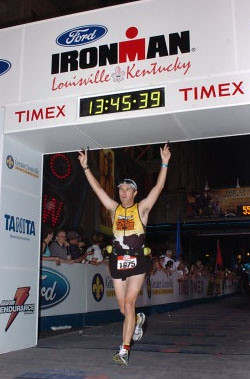Recent posts about Jacob Seilheimer running the Boston Marathon have resulted in some interesting discussion, though much of it happened via e-mail rather than blog comments. Much of that discussion focused on his completing the race without having qualifying and registering for the race. For many, the idea that others bandit races is disturbing.
It is a topic worth discussing, because there are a great many views on the subject. Never one to shy away from a controversial issue, I'll take a crack at addressing it.
For some, the concern is that bandits "steal" resources from the race. As bandits don't pay entry fees, anything they use on race day is paid for by someone else. This can include drinks, gels, paid and volunteer workers on the course, etc. Those who make this argument believe that everyone should pay their fare share.
The counter argument is that those resources are already there, and unless a bandit uses items that eventually result in a paid entrant NOT getting the support they need, the supposed harm is minimal. If a bandit drinks even 12-15 cups of Gatorade, the cost is minimal, given it would have been thrown out, anyway.
Another concern offered is that bandits somehow diminish the value of the race. The event is set up for serious athletes who are willing to at least put their name on the dotted line. Bandits have little invested in the race and distract from its nature.
The response to this argument tends to be that bandits have many reasons for opting out of signing up. Sometimes there is the cost. Other times there are other motives for running the race and paying to enter is counterproductive. Sometimes, runners just like supported training runs. While some bandits might somehow diminish the value of the race, others contribute to the event in their own way.
A third objection is that bandits, being unregistered, represent a risk to the race director and sponsor. If they were to be injured while running the race, the event would be at risk of a lawsuit. As the runner never signed a consent and release form, they can hold the race officials liable for any injury incurred. Many events are non-profit, and the risk of litigation poses a real and significant threat.
Others would counter that anyone running on the course without a registration would have no right to hold the race responsible for any injuries incurred on the course. They have no consent and liability form because they have no hold against the event. They are private individuals using public property for their exercise. If this argument is allowed in order to limit bandits from running the entire race, it would also have to be applied to any and all public traffic on the course. Just as spectators wouldn't have a valid claim if they twist their ankle running across the race course, bandits wouldn't have a valid claim if they are injured while running. Most would argue that any successful lawsuit of this nature is sign of a flawed judicial system.
One of the comments on Jacob's site indicated that Jacob hadn't, in fact, run the Boston Marathon. What he had done was completed a 26.2 mile run along the same route on the same day. In fact, it should be noted that many of the pictures on his site show him running on the sidewalk. If he had completed the journey in a more timely manner, would it make any difference? As an unregistered runner, he would have basically been doing a supported, well attended, widely broadcast training run.
On the other hand, do athletes have the right to expect that the person running next to them is a registered participant. What responsibility to we have to self-police ourselves? Is running as a bandit akin to cheating? After all, it is unacceptable to transfer bib numbers (unless allowed by the event directors). How would we respond if someone earned a slot at Kona in the 40-49 age group when they were 38?
Or is banditing something completely different?
Please share your thoughts. Keep in mind that while we may feel passionately about the subject, this is a friendly discussion and the opinions of others should be honored, regardless of agreement. Let the debate begin.
Monday, April 23, 2007
Subscribe to:
Post Comments (Atom)











13 comments:
As a businessman, I can see the harm in banditing. I've heard a guy here at work once casually say that he was going to bandit St. Anthony's - with transition area security getting stricter all the time, I doubt it would even be worth the trouble to bandit a Tri. This particular instance - while it shouldn't be casually condoned, it likewise doesn't merrit emotional discourse - it's almost as if he was a conciensious (sp) bandit - his impact to/on the race was insignificant.
Now had he took a number, run in the mix, used the aid stations, ran in the street - all of which would have been stealing assets he had not paid for with a race entry - then I'd say he's without honor and regardless of his accomplishment, he's forever an man without integrity. Its a little thing to some, but if it's easy to steal when the stakes are small, how much easier is it when the stakes are much higher?
I think if he had gotten in anybody's way, that is really bad form.
Had he actually used race resources, that would be stealing.
I am totally new to racing, having started just this year, but I really don't get the fuss over this. If he were out there making a mockery of that event, or trying to screw with people who trained for it, then I could see people getting on his case.
In this case, no harm no foul says me, I doubt he even had a BM cup of water.
And personally, reading his site inspired me to sign up for Philadelphia. So maybe I will hate this guy sometime during that race, but not today...Drew in NJ
As the above poster stated, if just one person was inspired by Jacob, I think it was worth it.
I'm normally a hardcore, follow-the-rules, no exceptions kind of person.
That said, the BOSTON MARATHON is an exception. There is a very long and well-established tradition of many bandits completing that race. The organizers are well aware of it and while they can't officially condone it, they don't actively discourage bandits.
It's a TRADITION there. Any other race I'd say absolutely not. But it's Boston, which is different.
Had a bandit gotten seriously injured or died while doing a race, chances are good that the family will seek litigation against the race organization for somehow not preventing the bandit from participating or whatever reason they can think of to help cover medical costs or the loss of a loved one. It's just the way things are, unfortunately.
I want to add that some bandits, like Jacob, are not as well-trained as registered participants and more prone to serious problems when doing extreme endurance events (heat stroke, heart-attack, etc). The fact that he/she was participating only because the race was going on (so not simply because he/she was just on a normal training run that coincided with the course) could certainly cause some families in times of terrible grief to blame the race organizers for what happened. And as you said, simply the threat of litigation would force many smaller race organizations to try to settle out of court (via insurance) rather than try to fight it because of prohibitive legal costs. So whether it’s right or wrong from a judicial standpoint doesn’t matter.
This is the last I’ll say on this matter.
Hmmmm.... I must confess this is a new concept to me, but an interesting one... I have to say that I don't think it is such a big "No No" since most people will want the priviledge of being an official entrant, so the organisers are probably not in danger of losing the bank...
I'm much more concerned about the rampant use of the term "Iron" by those who have not yet completed an Iron distance event. I'm shocked, shocked that such a thing would be done!!!
I'm more shocked at the photo that showed how many folks cut the IMFL swim course by not going around the outer end buoys. I know it was rough out there and hardly any race support crew out were out there watching but, sheesh, what's the point of doing an IM race if you don't go the whole distance? I suppose some people will just do whatever they want if they can get away with it ...
Something motivated a big guy to run 26.2 miles...let him be. No scratch that...cheer for him!
We can rationalize and justify virtually anything, from banditing a race to actions far more severe, and even more sinister. The question is how we will feel about ourselves when we look at that face in the mirror, or better yet, when we look our young child in the eye.
For me the decision is easy; if I want to race I pay. If I don’t want to pay then there are a bazillion miles of roads and trails I can ride or run on.
Talking to your chums about banditing a race seems so innocuous. "Go for a supported run, don't have to pay the fee..." But I agree for the most part that it should be put into perspective.
There are very very few bandits out of several tens of thousands of people in most races I think and the 'footprint' these people possess on on consumables has got to be such a small percentage.
If a person is willing to bandit I don't they have any problem looking at themselves in the mirror. I think bandits do it for cheapness or activism and neither of those produce much guilt.
I'm not for banditing races. Not because its a drain of resources or because they got one over on The Man, but because it cheapens the investment good people make to do the race.
Jacob's effort was heroic and beautiful. He ought to feel great pride. My hope is his accomplishment will continue to be an inspiration to himself and others.
But he didn't run the Boston Marathon.
Post a Comment